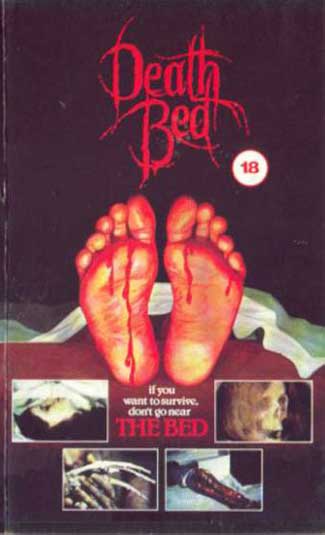 A strange, strange seventies horror flick about a carnivorous bed presided over by the spirit of Aubrey Beardsley(!). Released for the first time in 2003, it’s precisely the type of unclassifiable oddity cult movie buffs dream about.
A strange, strange seventies horror flick about a carnivorous bed presided over by the spirit of Aubrey Beardsley(!). Released for the first time in 2003, it’s precisely the type of unclassifiable oddity cult movie buffs dream about.
Inspired by a dream he’d had, writer/producer/director George Barry made DEATH BED: THE BED THAT EATS over a five-year period with a budget of $30,000. The 1977 result was a one-of-a-kind curio that unfortunately failed to obtain a US release and got exhibited in the UK only because of a pirated copy that was briefly released to home video. Now, after 26 years, DEATH BED is legitimately available on DVD for the first time, courtesy of Cult Epics, who’ve also sponsored the film’s exhibition on the 2003 festival circuit.
In an abandoned mansion a bed is possessed by an evil—and hungry—spirit. Nearby hangs an Aubrey Beardsley drawing (Beardsley, for those who don’t know, was a late 19th Century artist best known for his illustrations for Oscar Wilde’s SALOME), behind which the artist’s spirit is trapped. With nothing to do, the spirit spends his days admonishing the bed in voice-over, providing a narration of sorts.
Beardsley gradually fills us in on how things got to be the way they are. It seems a wind spirit living in a tree outside the house fell in love with a dying woman for whom it took on human form and built a bed. When she passed away the spirit was devastated, dripping tears of blood onto to the bed, which gave it life…but only when its fathering wind spirit is awake. When it sleeps the bed loses its power.
Over the years the bed ate a number of passer-by, including Beardsley himself. In his case, however, the bed, in an apparent bid for company, decided to resurrect Beardsley’s spirit and imprison it behind a drawing he made just before his death.
Back to the present: the bed is in the process of devouring a group of three young women. It toys with them psychically, imparting freaky nightmares and visions before sucking them into its maw. When one of their brothers shows up, the bed sucks the flesh off the poor guy’s hands, leaving behind a set of crumbling bones. It’s around this time that the wind spirit awakens, robbing the bed of its power; this allows Beardsley to branch out and telepathically inspire one of the women to destroy the bed in an obscure ritual involving her brother’s bones and fire.
This film’s loopy aura is probably best explained by George Barry’s comment that “DEATH BED came from a dream and, to begin with, I wrote the story as more a fairy tale than a horror film. We shot the story as possibly more horror film than fairy tale, then in the editing process DEATH BED tried to return to its fairy tale origins.” The end result is a film that plays like neither a fairy tale or a horror film, but which stakes out its own genre base.
What makes the film work is the utter conviction with which it’s put together, along with an absolutely fearless audacity that all great no-budget movies possess. Such an approach often has the effect of bringing the proceedings dangerously close to camp (the shots inside the bed, with people and objects falling through what looks like an aquarium shot over an orange background as chewing sounds fill the soundtrack, are particularly noteworthy in this regard), yet somehow Barry manages to keep things on a serious level throughout. It helps that Barry has a sense of humor about the proceedings (evident in the onscreen titles dividing the story into sections titled Breakfast, Lunch, Dinner and Just Desserts) and, even more so, that his filmmaking is so stylistically assured. The overall mood is a hypnotic one: quiet and serene, even in the most overtly horrific sequences (bolstered by the Beardsley character’s calm, studious voice-overs). In short, DEATH BED is almost the very definition of Dreamlike.
Vital Statistics
DEATH BED: THE BED THAT EATS
Cult Epics
Director/Producer/Screenplay: George Barry
Cinematography: Robert Fresco
Editor: Ron Medico
Cast: Demene Hall, Rusty Russ, Julie Ritter, Linda Bond, Patrick Spence-Thomas, Rosa Luxemburg, Dave Marsh, Ed Oldani, Marshall Tate, Dessa Stone
